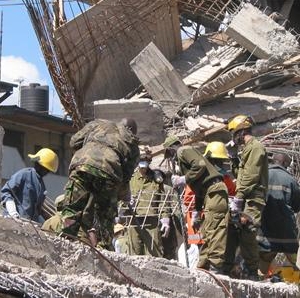Kenyans, at least most of them, have no respect or see no need for professionals; this is hardly surprising given the impecunious life of struggle and want led by the majority of the hoi polloi, and contrasted with a life of hedonistic pursuit and unbridled licentiousness led by the thieving upper class. Somewhere in the middle of the two lies the professional, who is in a constant battle to maintain a façade of being in a pseudo middle-class, while being viewed by the proletariat as a snobbish intellectual who is stuck in an ivory tower, and being seen as nothing more than a pesky enabler to the rich kleptocrats that pay for him to afford a suit and a tie.
This I say as one who has seen clients shocked that architectural fees are pegged to a percentage of the total cost of a project, and this by law not whim. You see the mentality in this country, and a lot of the neglected backwaters of the planet, is that it makes sense to pay for tangible goods, bricks and mortar so to speak, and not for services or intellectual property. Developers, if you can call the disgraceful charlatans and unscrupulous speculators that run the construction world here so, would rather pay a quack a pittance to do a mockery of a design for them, even when they intend to spend tens (if not hundreds) of millions of shillings on the actual construction of a building. In deed even the president himself once said Architects are too expensive for most Kenyans, which by itself amounts to a sanctioning of jua kali developments if you ask me.
The results of this attitude by the moneyed, that professionals can be dispensed with in the building processes, and the fact that the rest of the country can neither afford nor even care to know what role professionals play in construction, are not limited to the impoverishment of the highly skilled and properly qualified professionals, they also have seen the the springing up of unsightly to downright hideous and dangerous buildings which are more often than not illegally put up (with a council officer once telling me some construction sites are only active after dusk to dawn when officers are a slumber) In instances where the lethargic, and often complicit, City Council has tried to step in and order demolitions or stop ongoing unsanctioned developments, friends of the powerful, and who are supposed custodians of law and justice in our courts, have promptly stepped in to protect the accused with favourable rulings.
Of course these issues are only brought into focus when a tragedy occurs and lives are lost in collapse of buildings, such as happened in Langata and Embakasi recently, and Nyamakima and Kiambu a while back. Which is why I was not at all surprised to read this in the daily Nation:

“The building that collapsed in Embakasi killing at least four people had been earmarked for demolition by the City Council two years ago.
The developer of the building however moved to court stopping the demolition resulting to a battle whose climax was a court order that Town Clerk Philip Kisia be committed to 21 days civil jail.
Mr Kisia was at pains on Thursday, to explain the council’s efforts to stop the construction of the house in Pipeline estate.
The clerk further sent alarm over other illegal buildings in Embakasi-Pipeline, Kahawa West Phase II, Tassia, Umoja Zone 8 and 9, Kayole, Roysambu and Mwiki and cautioned tenants against occupying them.
He said council employees had been blocked from inspecting construction work in the estates by illegal gangs.”
How can we really expect better building standards if projects are done by charlatans or built without any drawings whatsoever, if outlawed gangs run sites instead of foremen, if criminals and gangsters build houses instead of developers, and if these tragedies are forgotten in a day and we carry on living in our precarious high-rise death traps because it has not happened to us?